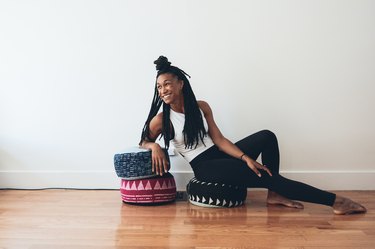
Together with Athleta, we're compiling actionable wellness advice you need from the experts—and Well+Good is bringing it to life all year long at events in NYC. Here, Yoga Foster founder Nicole Cardoza is sharing her tips on bringing yoga-inspired mindfulness into your real life.
Taking a deep, palo santo-filled breath when you enter a yoga studio instantly imbues a sense of calm, and flowing through asanas is a total-body de-stresser.
Video of the Day
Video of the Day
Yes, there's a reason so many people tap yoga for its mind-body benefits, but did you know that you don't have to drop those Zen feelings at the door when you leave the studio?
With a little creativity, you can apply the mindfulness benefits of yoga to the rest of your life (no palo santo required) with a little help from Yoga Foster founder Nicole Cardoza.
"[Yoga is] a complex, intimate, spiritual practice that can offer transformation for not just ourselves, but how we engage with the world around us," Cardoza says. "I think that it can help us feel more rooted in who we are and help us feel more grounded. This helps us show up more authentically wherever we are."
Keep reading for more of her intel on how to apply lessons learned in yoga to your life outside of the studio, from dealing with stress to supporting your career.
1. Practice Makes Perfect
There's a reason this adage gets repeated so often—because it's more challenging to adhere to than it seems. Yoga is referred to as a "practice" because it's not about mastering a handstand or becoming the most flexible person in the room—it's about the benefits you gain from the journey to achieving those things.
Instead of rigidly focusing on the end point of the goals you're trying to achieve—whether that's a promotion, a relationship, a new house, etc—Cardoza advises allowing yourself the flexibility (no pun intended) to try new things along the way. "Alignment is a practice, not a destination," she says.
2. Schedule Breathing
Ever find yourself rushing to meet a work deadline or having a tough conversation with a friend only to realize you've been holding your breath? Taking deep breaths helps to release stress from your body, and yoga can help you get in the habit of doing so when those tense moments strike.
Here's the deal: During a yoga class, you take a breath with each movement to make flowing through the sequence more effortless, and you can apply the same technique to your life by reminding yourself to breathe through stress.
"See where you can introduce ease into your work," Cardoza says. "Add time in your schedule to take deep breaths and reflect on the day. It's a practice that's worth extending out of yoga into everyday life."
3. Seek Inclusivity
Admit it: We all look around the room when we walk into a studio (yoga or otherwise) scanning for familiar faces or just scouting for a spot that's not too close to the front. In those moments—whether they're in a fitness studio or a board room—Cardoza invites people to think about who they don't see.
"Always pay attention to who's not in the room," Cardoza says. "Barriers of entry are very similar in a yoga class and in the office room. Allow this practice of union to carry off the mat and encourage you to seek inclusivity in every space." While yoga can be super introspective, this subtle shift in mindset can help you pay it forward and focus on lifting up those around you as well.
4. Be Honest With Yourself
"Yoga is a practice of self inquiry," Cardoza says, and it encourages you to make an honest assessment of how your body is feeling from day to day—in the same way you should take frequent inventory of how you're feeling about your life.
This practice is particularly useful for making career decisions, but can be also applied to relationships and more. "As your career grows, keep an honest dialogue with yourself about how you feel in your role," Cardoza says. "Do you feel safe and supported? Challenged, or threatened? Acknowledging these feelings as they arise may help you create more healthy boundaries."